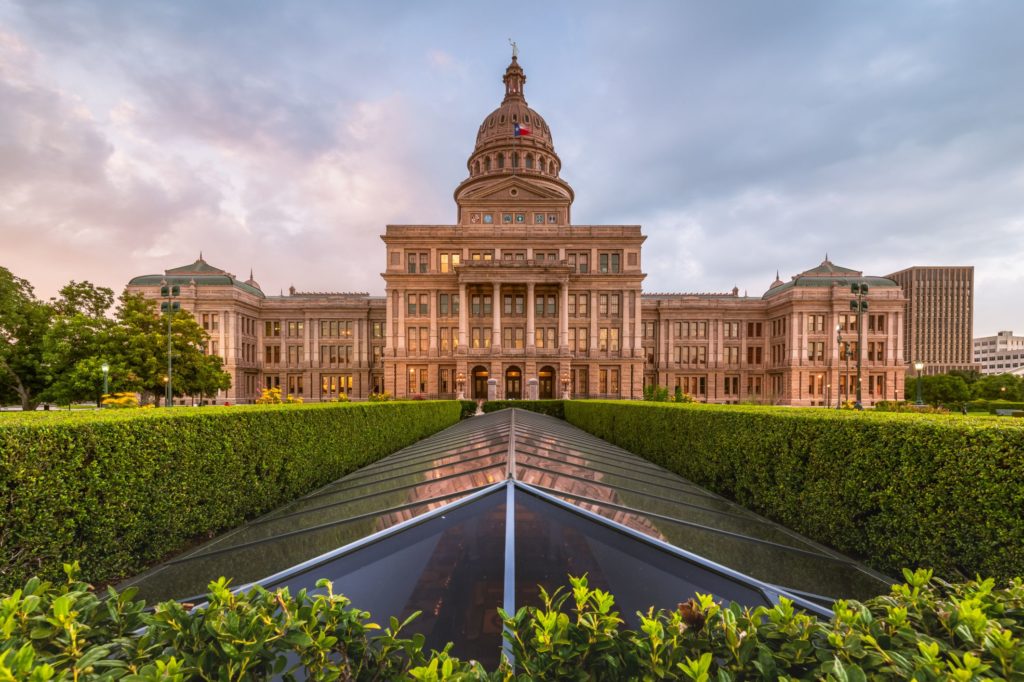November 5th, 2019 is Election Day in Texas. This upcoming election includes many important measures including a proposed bond and constitutional amendments. This blog highlights the constitutional amendments Texans will vote in the November election.
On November 5th, 2019, Texans will have the opportunity to make their opinions heard by voting for 10 proposed amendments to the state Constitution. These amendments cover a broad brush of issues, ranging from school funding, flood infrastructure, and the state income tax.
Per the Texas Constitution, the only way to amend the Constitution is through the Texas legislature with voter approval. To make it onto the ballot, the amendments must pass through both the Texas House and the Texas Senate with two-thirds support from each. Governor Abbott’s signature isn’t necessary for these amendments to appear on the ballot, but any legislation associated with a certain amendment does need his approval.
The 86th Legislative session, which wrapped up on May 27th, produced all 10 of the proposed amendments appearing on the ballot this fall. Constitutional amendments are proposed through joint resolutions in either the Texas House or Senate. (You can read more about highlights from this past legislative session here.)
Learn more about the 10 joint resolutions that have the potential to become constitutional amendments below:
House Joint Resolutions
HJR 4: Creation of Flood Infrastructure
House Joint Resolution 4 calls for the creation of a flood infrastructure fund to cover expenses relating to drainage, mitigation, and flood control. The amendment, if passed, would put 1.7 billion dollars in flood repair and control efforts across the state. HJ4 4 is proof that disaster management was made a huge priority this past legislative session, prompted by the damage Hurricane Harvey on the Gulf Coast.
HJR 12: Increase the Bond Amount for the Cancer Prevention and Research Institute of Texas
Authored by Representative John Zerwas, who is also a physician serving on the Appropriations Committee, House Joint Resolution 12 would give 3 billion in general obligation bonds for grants for the state’s cancer fighting organization, the Cancer Prevention and Research Institute of Texas. Under the proposed amendment, the bond amount for the agency would increase from 3 billion to 6 billion.
HJR 34: Calling for a Temporary Lowering of Tax Rates on Property Damaged in a Disaster
Another example of disaster management making its way into the Texas Legislature. House Joint Resolution calls for the state to lower property taxes on property damaged during a state-wide disaster declared by Governor Abbott. This modification in taxes would be temporary, and the tax exemption rates are outlined in House Bill 492 which was signed by the governor in June.
HJR 38: Ban on the Creation of a State Income Tax
House Joint Resolution 38 bans the creation of a state income tax. Out of all 10 constitutional amendments, this one may prove to be the most controversial. Senate Democrats who opposed the bill raised concerns against the term “individuals,” mentioned in the resolution, arguing that the resolution could be interpreted to allow an income tax on businesses. Their concerns originated from a report released by the nonpartisan Legislative Budget Board. Senator Royce West (D-Dallas) proposed an amendment to the resolution to clarify the language, but it ultimately failed.
HJR 72: Allowal of One Person to be Elected to Multiple Municipal Judgeships
Under House Joint Resolution 72, individuals would be able to be elected to multiple municipal judgeships, rather than being appointed to each judicial judgeship. This amendment was designed with small rural communities in mind, as they often have difficulties finding multiple people to serve in their judgeships.
HJR 95: Tax Exemption for Metals in the Texas Bullion Depository
House Joint Resolution proposes that precious metals currently held in the Texas Bullion Depository. Texas is the only state in the country with a state metal depository, and many in the legislature believed that local property taxes on metals was hurting Texas in comparison to other states.
HJR 151: Increasing the Amount Distributed to Texas Schools
Currently, the General Land Office distributes 300 million in funds to schools across the state of Texas. If passed, this amendment would increase that amount to 600 million.
Senate Joint Resolutions
SJR 24: Directing Revenue from the Sporting Goods Sales Tax to Texas Parks and Wildlife Department and the Texas Historical Commission
The constitutional amendment proposed by Senate Joint Resolution 24 stipulates that revenue generated from the sales tax on sporting goods should be put toward state park operators. This was the original purpose of the tax, but state parks in Texas have received less than half of the 2.8 billion in revenue from the tax since its adoption in 1993.
SJR 32: Allowing the Transfer of a Law Enforcement Animal to a Caretaker
This joint resolution allows police dogs or other law enforcement animals to retire with a certified caretaker. Currently, the state constitution prohibits the transfer of property from the state government to a private person or entity for free. This amendment would make an exception for law enforcement animals, which are considered property of the state.
SJR 79: Permission for the Texas Water Development Board to Sell Bonds
Voters have the opportunity to decide if the Texas Water Development Board should be allowed to sell bonds. The money generated from the bonds would be used to fund water supply and facility management in cities struggling financially.
Voting day is November 5 and you must be registered to vote in Travis County by October 7.

